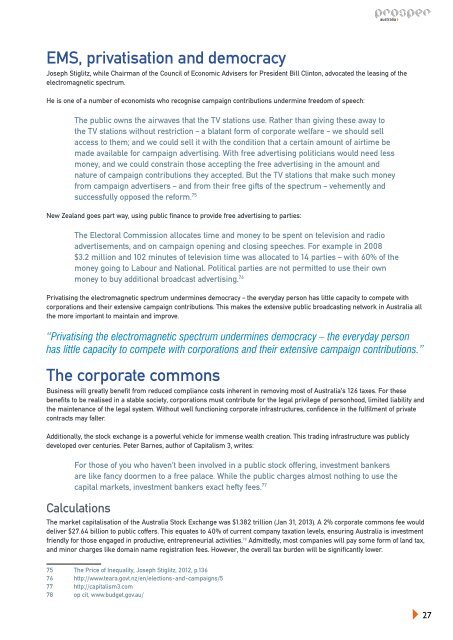TOTAL RESOURCE RENTS OF AUSTRALIA
You also want an ePaper? Increase the reach of your titles
YUMPU automatically turns print PDFs into web optimized ePapers that Google loves.
EMS, privatisation and democracy<br />
Joseph Stiglitz, while Chairman of the Council of Economic Advisers for President Bill Clinton, advocated the leasing of the<br />
electromagnetic spectrum.<br />
He is one of a number of economists who recognise campaign contributions undermine freedom of speech:<br />
The public owns the airwaves that the TV stations use. Rather than giving these away to<br />
the TV stations without restriction – a blatant form of corporate welfare – we should sell<br />
access to them; and we could sell it with the condition that a certain amount of airtime be<br />
made available for campaign advertising. With free advertising politicians would need less<br />
money, and we could constrain those accepting the free advertising in the amount and<br />
nature of campaign contributions they accepted. But the TV stations that make such money<br />
from campaign advertisers – and from their free gifts of the spectrum – vehemently and<br />
successfully opposed the reform. 75<br />
New Zealand goes part way, using public finance to provide free advertising to parties:<br />
The Electoral Commission allocates time and money to be spent on television and radio<br />
advertisements, and on campaign opening and closing speeches. For example in 2008<br />
$3.2 million and 102 minutes of television time was allocated to 14 parties – with 60% of the<br />
money going to Labour and National. Political parties are not permitted to use their own<br />
money to buy additional broadcast advertising. 76<br />
Privatising the electromagnetic spectrum undermines democracy – the everyday person has little capacity to compete with<br />
corporations and their extensive campaign contributions. This makes the extensive public broadcasting network in Australia all<br />
the more important to maintain and improve.<br />
“Privatising the electromagnetic spectrum undermines democracy – the everyday person<br />
has little capacity to compete with corporations and their extensive campaign contributions.”<br />
The corporate commons<br />
Business will greatly benefit from reduced compliance costs inherent in removing most of Australia’s 126 taxes. For these<br />
benefits to be realised in a stable society, corporations must contribute for the legal privilege of personhood, limited liability and<br />
the maintenance of the legal system. Without well functioning corporate infrastructures, confidence in the fulfilment of private<br />
contracts may falter.<br />
Additionally, the stock exchange is a powerful vehicle for immense wealth creation. This trading infrastructure was publicly<br />
developed over centuries. Peter Barnes, author of Capitalism 3, writes:<br />
For those of you who haven’t been involved in a public stock offering, investment bankers<br />
are like fancy doormen to a free palace. While the public charges almost nothing to use the<br />
capital markets, investment bankers exact hefty fees. 77<br />
Calculations<br />
The market capitalisation of the Australia Stock Exchange was $1.382 trillion (Jan 31, 2013). A 2% corporate commons fee would<br />
deliver $27.64 billion to public coffers. This equates to 40% of current company taxation levels, ensuring Australia is investment<br />
friendly for those engaged in productive, entrepreneurial activities. 78 Admittedly, most companies will pay some form of land tax,<br />
and minor charges like domain name registration fees. However, the overall tax burden will be significantly lower.<br />
75 The Price of Inequality, Joseph Stiglitz, 2012, p.136<br />
76 http://www.teara.govt.nz/en/elections-and-campaigns/5<br />
77 http://capitalism3.com<br />
78 op cit, www.budget.gov.au/<br />
27



